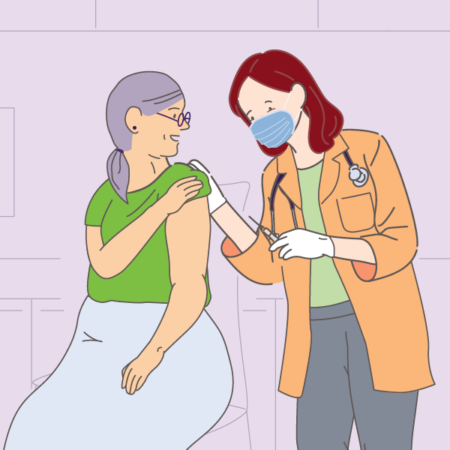
Influenza
Signs, symptoms and how to protect yourself this flu season.

Anyone of any age can contract pneumococcal pneumonia, but those at a higher risk are:
• People 70+ years
• People who use tobacco cigarettes with medical conditions such as diabetes, cancer or a chronic disease affecting the lungs, heart , kidney or liver
• Tobacco smokers
• Indigenous Australians
• Infants aged 12 months and under
It’s important to remember that no matter how healthy and active you are, your risk for getting pneumonia increases with age. This is because our immune system naturally weakens with age, making it harder for our bodies to fight off infections and diseases.
Under the National Immunisation Program, the following groups are eligible for a free vaccine due to their increased risk of complications from pneumococcal pneumonia:
Vaccines are the best defence to reduce the spread of pneumonia. If you are not eligible for a free vaccine, it could still be worth talking to your doctor as you can still receive it by paying for it. Your doctor will be able to provide a recommendation on your personal health circumstances. The cost depends on the type of vaccine, the formula and where you buy it from. Your immunisation provider, such as your doctor or pharmacist, can give you more information or you can visit the Department of Health website here. Influenza is a common preceding viral infection. Being vaccinated against influenza can also help prevent that infection and the pneumonia which may complicate it.
Bacterial pneumonia: One of the most severe and potentially life-threatening forms of pneumonia is pneumococcal pneumonia, which is caused by the bacterium, Streptococcus pneumoniae. This bacterium is responsible for approximately 1.6 million deaths each year, world-wide. Healthy people may carry the bacteria in their nose and throat. While most of the time this does not cause any illness, vulnerable groups such as those of the age of 70, infants, people with a chronic illness etc. may develop pneumococcal disease.
Viral pneumonia: caused by various viruses, including influenza. It is thought that around half of pneumonia cases are attributed to this type of pneumonia.
Mycoplasma pneumonia: caused by the bacterium Mycoplasma pneumoniae. This type of pneumonia can have some different symptoms and physical signs such as white phlegm, nausea and vomiting. Pneumonia caused by mycoplasma organisms is generally mild, but recovery takes longer.
Other pneumonias: There are other less common pneumonias with other causes such as fungal infection.
The symptoms of pneumonia depend on the age of the person, the cause and severity of the infection, and any existing problems with immunity. If you or your child or the person you are caring for seems to be recovering well from a cold or flu, but then gets worse, pneumonia may be the cause. See your doctor immediately, since pneumonia can be life threatening to babies, young children and people aged 70 and over. Some of the symptoms of pneumonia may include: